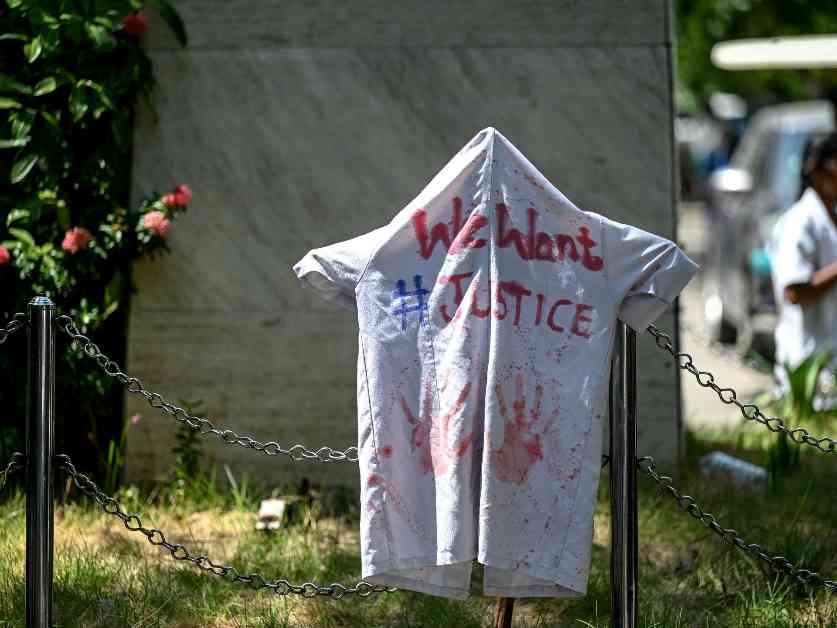Indian Doctors Nationwide Strike Against Kolkata Medic’s Rape & Murder – Impact & Demands
In a show of solidarity and outrage, hundreds of thousands of Indian health workers and their supporters have initiated a nationwide strike to protest against the heinous rape and murder of a trainee doctor at a government hospital in Kolkata. The incident, which occurred last week at the state-run RG Kar Medical College and Hospital, has sparked widespread condemnation and calls for justice in a country grappling with issues of violence against women and healthcare worker safety.
Protests and Shutdown
On Saturday, hospitals and clinics across India observed a 24-hour shutdown as medical professionals and their allies gathered to demand protection for health workers and condemn the violence that claimed the life of the young doctor. Led by doctors and healthcare workers, the protests were joined by tens of thousands of Indians from various walks of life, all united in their demand for action.
The strike, which commenced at 6 am local time, saw hospitals turning away non-emergency patients and faculty from medical colleges stepping in to handle urgent cases. The message from the protesters was clear: justice must be served. Chants of “We want justice” reverberated through the streets of Kolkata as demonstrators called for improved working conditions and safety measures not just for medical professionals but for all women in society.
One poignant sign held up by a protester succinctly captured the sentiment of the crowd: “Hands that heal shouldn’t bleed.” The tragic discovery of the doctor’s lifeless body in a hospital seminar hall has triggered a wave of anger and frustration, prompting a nationwide outcry for accountability and change.
Outrage and Demands
The Indian Medical Association (IMA), representing over 400,000 medics, has strongly condemned the “crime of barbaric scale” and highlighted the urgent need for safe spaces for women in healthcare settings. The brutal nature of the doctor’s murder, coupled with the failure to ensure her safety while on duty, has exposed glaring gaps in the system that must be addressed promptly.
Medical professionals are pushing for the enactment of the Central Protection Act, legislation designed to shield healthcare workers from violence. They are also advocating for stricter laws that would classify any assault on on-duty medics as a non-bailable offense, underscoring the gravity of the issue at hand. The demand for justice is not just a quest for closure but a plea for systemic reform to prevent such atrocities from recurring.
Rakhi Sanyal, a doctor and professor in Kolkata, minced no words in denouncing the “brutal murder” of her colleague and emphasizing the need for accountability. She stressed that the administration bears the responsibility of safeguarding healthcare workers and ensuring a secure work environment. The prevailing sense of insecurity among medical professionals underscores the urgency of implementing concrete measures to protect those who dedicate their lives to saving others.
Nationwide Impact
The ripple effect of the Kolkata doctor’s tragic fate has reverberated across the nation, with hospitals and clinics in various cities joining the strike in a display of solidarity and defiance. From Lucknow to Ahmedabad, Guwahati to Chennai, healthcare workers have united in their demand for justice and safety. The strike is not just a symbolic gesture but a powerful statement of unity and resolve in the face of adversity.
The murder of the young doctor has laid bare the stark reality of the dangers faced by women in healthcare settings and the urgent need for comprehensive reforms to address systemic vulnerabilities. The outpouring of support from doctors, nurses, and allied healthcare professionals reflects a collective determination to seek justice and ensure a safer environment for all.
As federal investigators take over the probe into the crime, questions linger about the initial handling of the case by state authorities and the broader implications for women’s safety in India. The prevalence of unreported cases of violence against women underscores the pervasive culture of silence and stigma that continues to hinder progress in addressing gender-based violence.
Call for Action
The time for complacency is over. The rallying cry of “Enough is enough” echoes through the streets of New Delhi as doctors and activists demand concrete action to protect healthcare workers and uphold the rights of women. The need for stringent laws, swift justice, and unwavering support for survivors of violence has never been more urgent.
The fight for justice is not just a battle for one individual but a collective struggle to ensure that no one else suffers a similar fate. The demands put forth by healthcare workers are not unreasonable; they are essential steps towards creating a safer, more equitable society for all. The time to act is now, before another life is lost and another voice silenced.
In conclusion, the nationwide strike by Indian doctors and healthcare workers serves as a stark reminder of the urgent need to address issues of violence against women and ensure the safety of those on the front lines of healthcare. The outpouring of support and solidarity from across the country underscores the determination of a united front to seek justice and demand change. As the nation grapples with the aftermath of this tragedy, it is incumbent upon all stakeholders to heed the calls for action and work towards a future where every individual can live and work without fear of violence or harm.



























